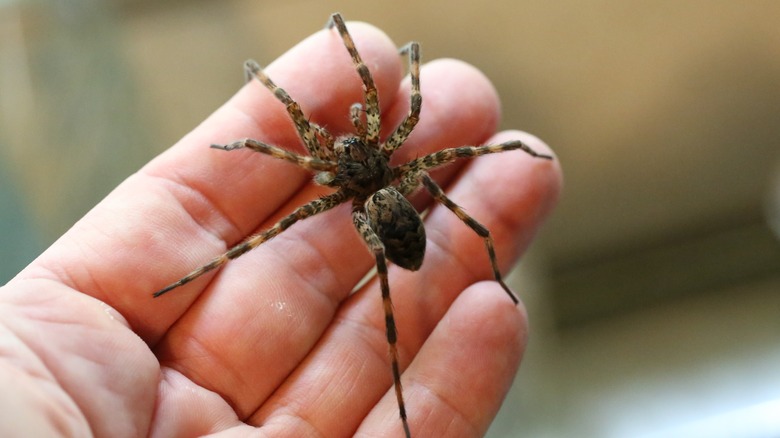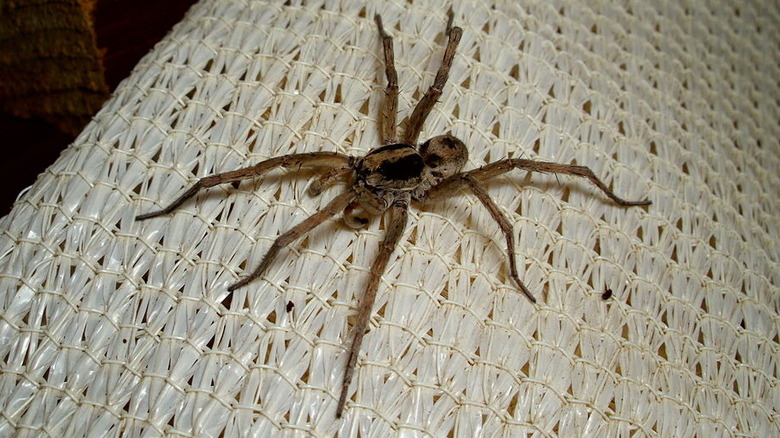Wolf Spiders Will Be A Thing Of The Past With A Few Items You Already Have In The Kitchen
If you're battling wolf spiders in your home, a natural repellent formulated with peppermint oil, dish soap, and water might help. A 2018 study published in the Journal of Economic Entomology demonstrated the effectiveness of mint oil in repelling L. geometricus and A. diadematus S. grossa spiders. However, this study stands as one of the few pieces of research directly linking peppermint with spider deterrence, as most studies focus on insects rather than arachnids.
While research is limited, there's anecdotal evidence supporting peppermint's repellent properties since many online sources rave about this formulation. For this reason, it is worth further exploring the topic. One possible reason for peppermint's potency against spiders is the presence of monoterpenoids. A 2010 study in the Journal of Insect Science highlighted these compounds' effectiveness as potent insect repellents. Additionally, peppermint contains menthol, another well-known insect repellent, per a 2012 study published in the journal Parasites & Vectors. The combination of these elements could explain the success of peppermint oil in repelling spiders, despite all studies being focused on insects.
When it comes to dish soap, its role in repelling spiders is equally noteworthy. It can disrupt the spider's egg cycle, and if it contains citrus elements, the repellent effect intensifies as spiders detest the smell of citrus. Moreover, the dish soap makes the peppermint oil solution stronger by effectively breaking apart the molecules of oil and water, two substances that normally repel each other. This makes the mixture more effective at keeping spiders away.
Identifying and understanding wolf spiders
To effectivey get rid of wolf spiders, it helps to understand more about their habitats and feeding habits. Wolf spiders stand out in the world of arachnids with their distinctive look and behavior, making them a noteworthy subject in pest control. To identify these spiders, look for their robust, hairy, brown or black bodies, often marked with patterns that help them blend into their surroundings. Their breeding habits and preferred habitats are also key factors in effectively managing their presence. Typically, during the daytime, they are frequently on the move, chasing after prey, since they don't use webs. These spiders seek out quiet, undisturbed areas, which is why they often take up residence in homes and gardens, with a fondness for garages and lower-level areas such as basements. Managing wolf spider populations is important not just for comfort or to alleviate fear but also for ecological reasons. A high number of these spiders in your home might signal an ecological imbalance. Although wolf spiders are not typically aggressive toward humans, their large size and quick movements can be startling.
Aside from their appearance and behavior, they play a significant role in the ecosystem. As predators, they help manage the population of other insects and pests. Their presence, in a balanced number, contributes to the natural pest control in your garden or yard. However, when their numbers increase significantly, it could disrupt this balance, leading to more noticeable and potentially problematic encounters with these spiders.
Using peppermint oil and dish soap spray
To create a spider-repellent spray, begin by combining a few drops (between 5 and 10) of peppermint oil with two cups of water in a spray bottle. Next, add a tablespoon of dish soap and shake. The exact mixture ratio can be adjusted, but the aim is to achieve a strong yet not overwhelming peppermint aroma. To maximize the effectiveness of your efforts to deter the spiders, focus on applying it in areas where they are most likely to be. This includes corners, near windowsills, and around door frames. For consistent effectiveness, it's crucial to reapply this homemade spray regularly. This is especially necessary after housecleaning activities or external factors such as rain or strong winds, which could reduce the spray's presence. In addition to using the spray, keeping your home clean and free of clutter plays a significant role in deterring spiders. By removing potential spider hiding spots, you enhance the overall efficiency of the repellent.
It's also worth considering the times of the year when spider activity increases, typically during early fall or spring. During these periods, extra vigilance and more frequent application of the spray might be necessary. Additionally, pay attention to outdoor areas like garages and garden spaces, as these can be initial points of entry for spiders into your home.


